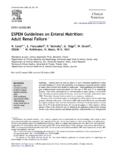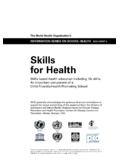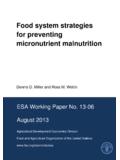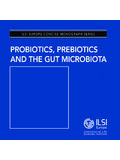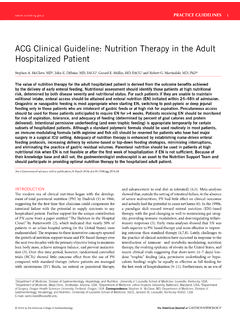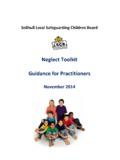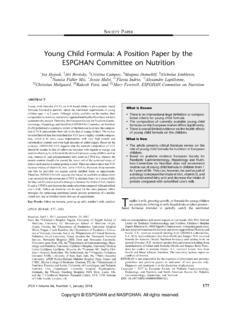Transcription of Setting the Table Nutritional guidance Setting the Table ...
1 Setting the TableNutritional guidance and food standards for early years childcare providers in Scotland5011 1 the TableCover 112/12/2014 13:45 Published by NHS Health Scotland1 South Gyle CrescentEdinburgh EH12 9EB NHS Health Scotland 2015 ISBN: 978-1-84485-585-6 All rights reserved. Material contained in this publication may not be reproduced in whole or part without prior permission of NHS Health Scotland (or other copyright owners). While every effort is made to ensure that the information given here is accurate, no legal responsibility is accepted for any errors, omissions or misleading Health Scotland is a WHO Collaborating Centre for Health Promotion and Public Health resource may also be made available on request in the following formats: Please contact 0131 314 5300 or email printBSLaudiotranslationseasy to readbrailleCover 212/12/2014 13:451 Contents Ministerial foreword 31 Why is this guidance important?
2 5 Who is this guidance for? 7 How can this guidance support the health and wellbeing of young children? 8 How does this guidance help childcare providers meet regulatory requirements? 11 Links to national policy 162 Food and nutrition from birth to 1 year 17 Feeding babies in the first year of life 18 Breastfeeding 21 Formula feeding 26 Introduction of complementary foods (weaning) 31 What foods should be avoided from six months to 1 year? 36 How to prevent babies from choking 37 Guidelines for the introduction of solids before six months 38 Providing food for babies in a childcare Setting 39 Suitable drinks for babies from six months 40 Discussing feeding requirements with parents 41 Vitamin supplements for babies 42 Menu planning from six months to 1 year 443 Food, snack and drink guidance for children aged 1 to 5 47 The importance of good nutrition 48 What is a healthy balanced diet for 1- to 5-year-olds?
3 49 Food standards for 1- to 5-year-olds 51 Guidelines for salt (sodium chloride) intake in young children 57 Guidelines for snacks and drinks in young children 60 Fluid requirements in young children 63 What about breakfast? 63 Supporting parents to provide healthy packed lunches 64 Vitamin supplementation 65 Sample two-week menu 69 Nutrient requirements of children aged 1 to 5 71 The eatwell plate 7424 Putting the guidance into practice 75 Menu planning 76 Providing a suitable environment 80 Encouraging good eating habits 82 Food policy development 86 Working in partnership with families and other agencies 92 Staff development and training 93 Monitoring and evaluation 94 Food safety and hygiene 945 Meeting the needs of all children 97 Vegetarian diets 98 Food for religious faiths and beliefs 100
4 Children with special, modified or therapeutic diets 101 Allergies 102 Children with additional needs 1066 Developing a holistic approach to Nutritional health and wellbeing 107 Maintaining a healthy weight in young children 108 Oral health for young children 109 Physical activity for young children 1127 Playing and learning with food 1158 Links and other resources 131 National documents and leaflets 132 Working group 134 References 1353 Ministerial forewordValuing and supporting Scotland s childcare providers is one of the best ways we can help make Scotland the best place in the world to grow up.
5 We know that eating habits developed in the early years frequently last into adulthood, so childcare providers have an ideal opportunity to support the development of positive food habits from a very early age. This revised Nutritional guidance supports an important aspect of the care provided by a range of providers across Scotland. This includes nursery education, childminders, family centres and anyone who is providing meals, snacks and drinks for young children in their care. Parents and foster carers will find this guide useful so they know what to expect from their childcare provider and also to gain some insight into the importance of a well-balanced diet for young children.
6 Parents are key to the implementation of this guidance as they can provide important information about their individual child s needs. The childcare Setting also has a unique opportunity to act as a role model, potentially influencing food provision in the home. It is, therefore, important for childcare providers to work alongside parents when implementing this guidance celebrates the contribution that childcare providers can have in shaping the future eating patterns of young children in Scotland. Implementing this guidance will: champion the importance of a well-balanced diet and positive choices both with children and their parents assist providers to work with families who face the biggest challenges in providing a healthy diet for their children highlight the importance of food as a tool for social development and guidance will give childcare providers standards for food provision, but it also provides guidance and practical solutions.
7 These are aimed at making it easier for providers to understand the positive difference they can make to a child s Nutritional intake and ultimately their future health. We recognise that caring for a child can be difficult, particularly when children and their families live in challenging circumstances. Providing meals, snacks and drinks that meet a child s Nutritional needs provides an extra safety net for many children across Scotland. Aileen Campbell MSP Minister for Children and Young People45 Why is this guidance important?16 This guidance has been developed to help early years childcare providers to meet the Scottish Government National Care Standards: Early Education and Childcare up to the age of 16 (2009).
8 It also highlights the importance of nutrition in the early years and the role that childcare providers have in shaping both current and future eating patterns in young children in Scotland. In light of new evidence and changes in policy, this resource provides updated guidance and standards for food and drink provision in childcare settings for young children and babies from birth to the age of 5 years. It is an update of the Nutritional guidance for the Early Years: Food Choices for Children Aged 1 5 Years in Early Education and Childcare Settings (2006) and combines with the content of Adventures in Foodland (NHS Health Scotland, 2004) to include practical activities to encourage healthier choices in young children.
9 This updated guidance builds on examples of good practice demonstrated by childcare providers and has been designed to support the implementation of Pre-Birth to Three: Positive Outcomes for Scotland s Children and Families (Learning and Teaching Scotland, 2010) and Curriculum for Excellence (Scottish Executive, 2004). This new guidance has been expanded to include the needs of babies from birth to 1 year. We are aware that more and more providers are asking for guidance on the feeding needs of babies in their care and this resource provides the most up-to-date evidence. Childcare providers have a unique opportunity to provide a supportive environment for babies who are breastfed and to ensure that parents are given consistent messages about feeding their babies.
10 This resource also provides health and safety guidance associated with feeding the implementation of the previous guidance in 2006, we have seen significant improvements in food and drink provision in early years settings. For example, it is now usual practice for care settings to provide healthier snacks and we are seeing an increase in the amount of water and milk provided as between-meal drink choices. Improvements such as this contribute to improvements in child health; for example, reducing the levels of tooth decay and maintaining a healthy weight. We do, however, still have a lot to do and childcare settings are ideal environments to provide opportunities for young children to experience new tastes, develop social skills and enjoy healthy options that will stay with them until early years experiences can have a fundamental impact on all aspects of development physical, emotional and intellectual.

